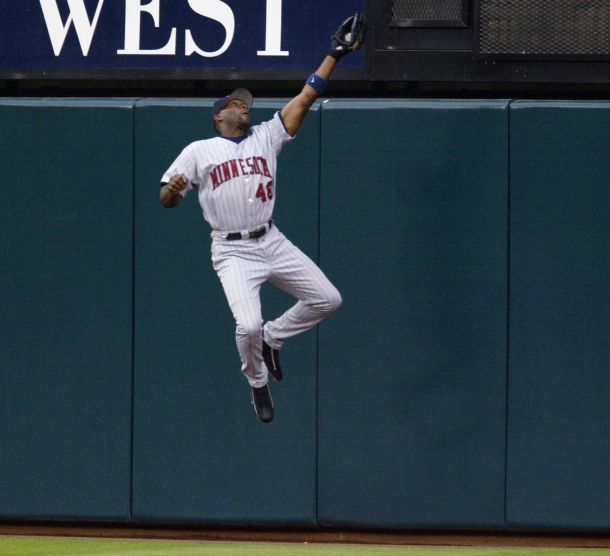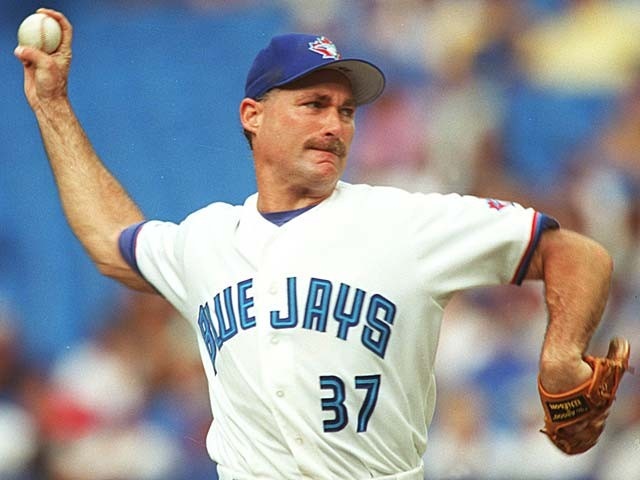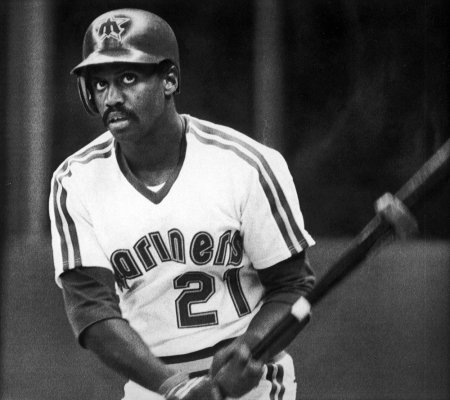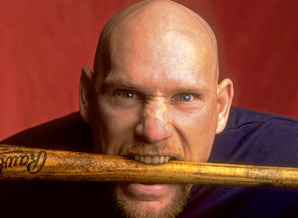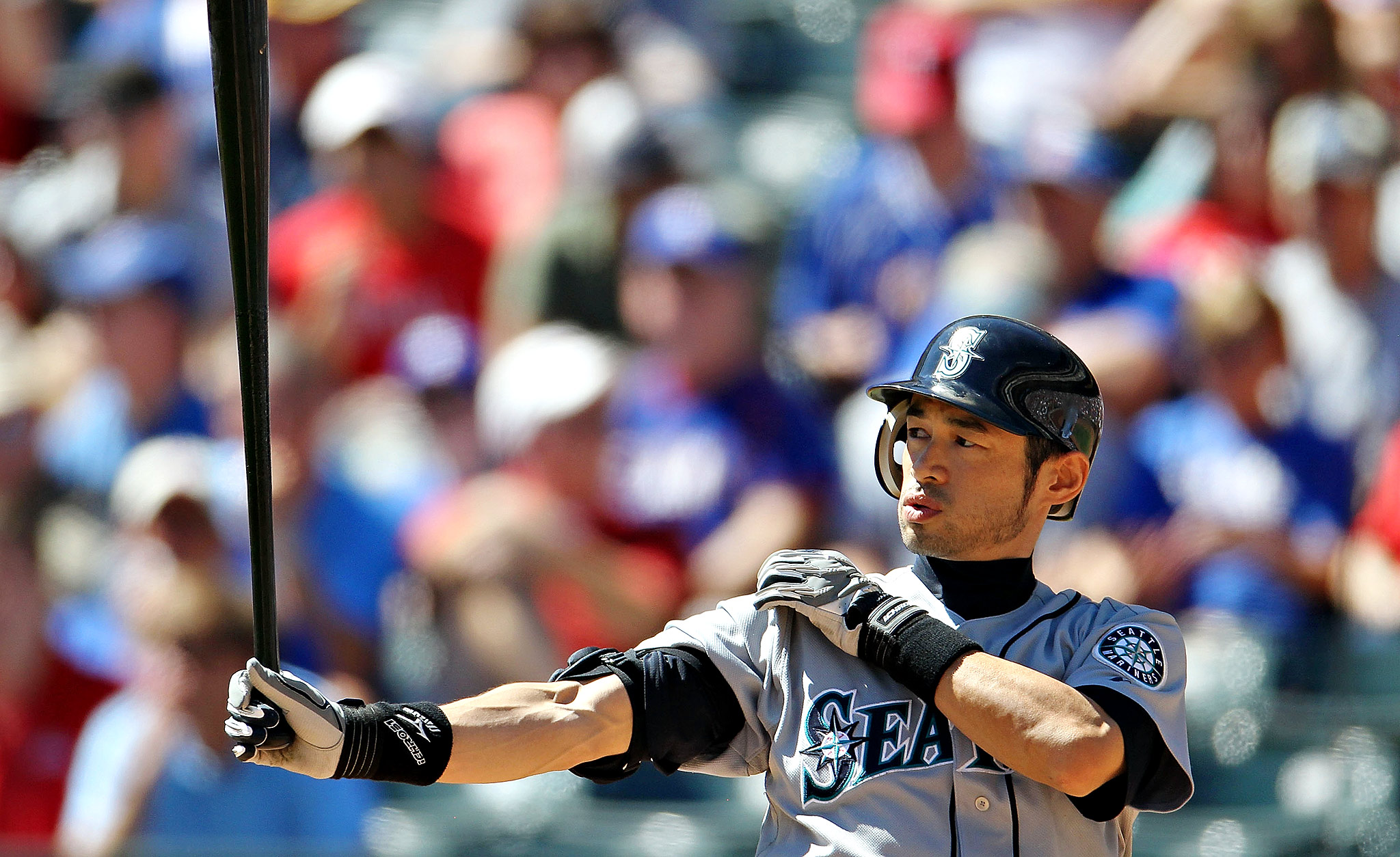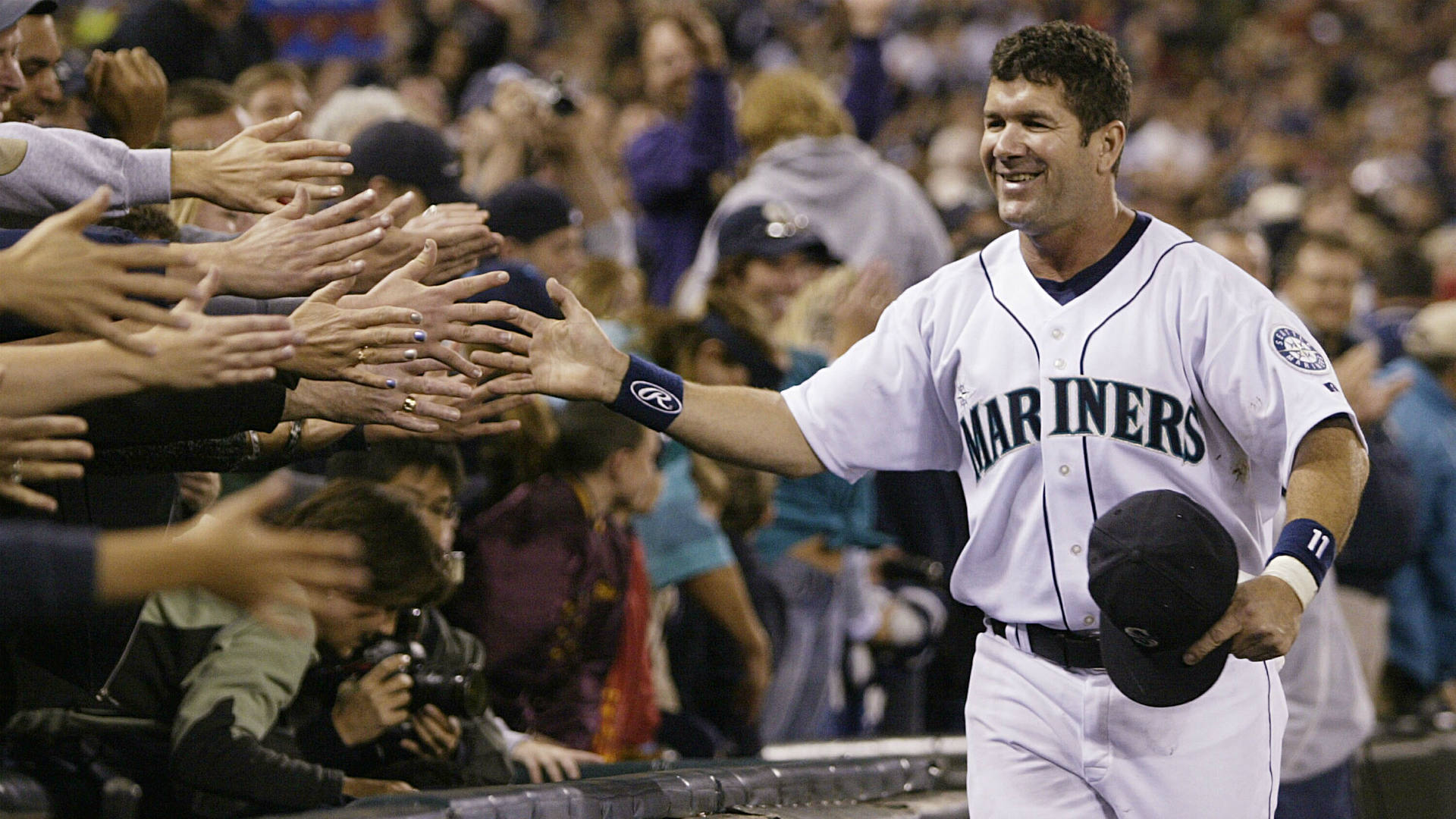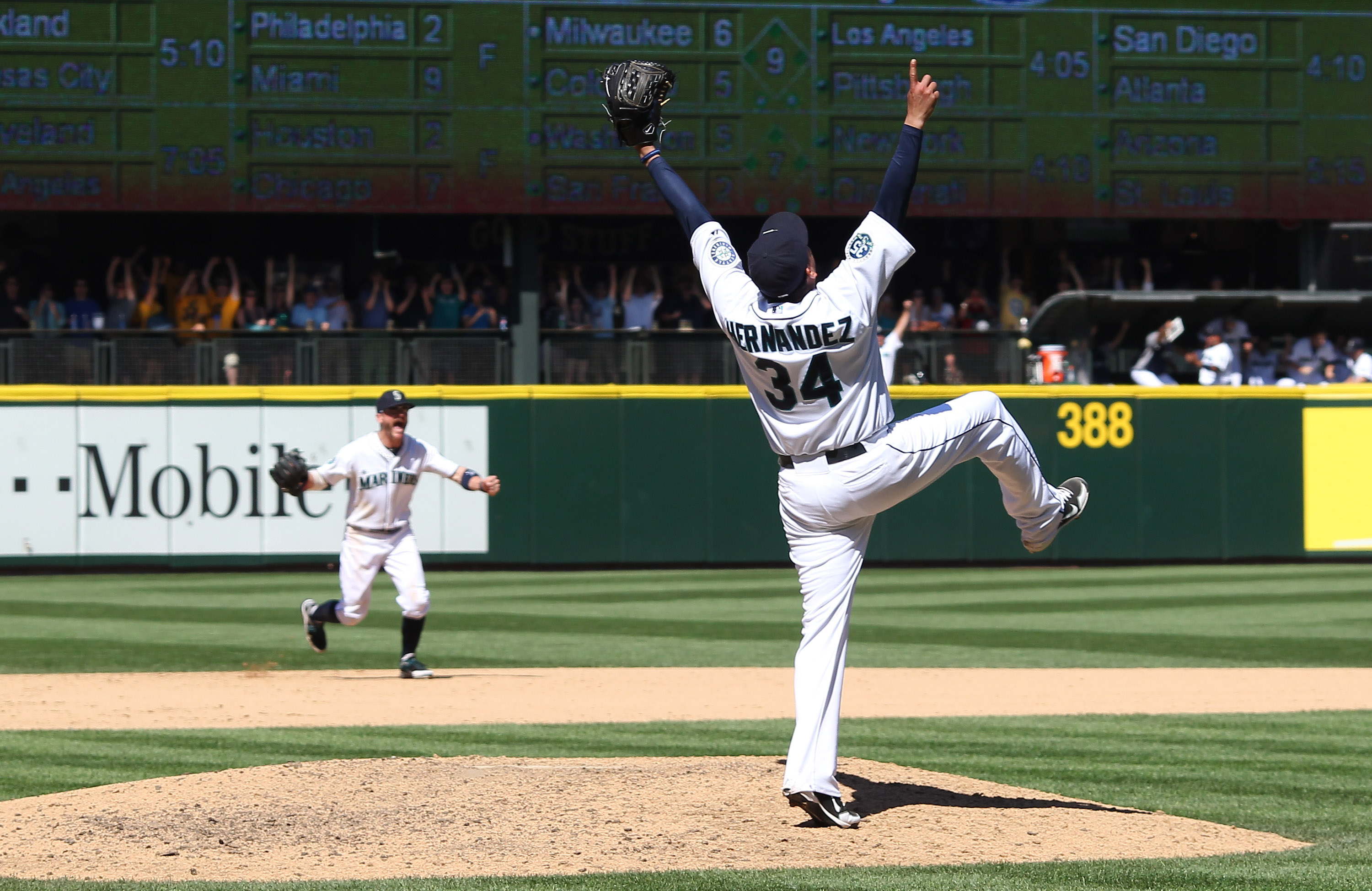(
My goal during the 2016 season is to write one blog post per week
and publish them every Friday. Many of them will be Hall of Fame
evaluations, but I am happy to get feedback on anything you all want to
read about, or specific players you would like me to evaluate. Thanks
for reading!)
The Seattle Mariners are a funny franchise. They have had some of the most incredibly talented players in MLB history play for their team, yet they have never made it to a World Series. They have a 0.467 winning percentage and have had 28 losing seasons (out of 40), yet they have the single most successful regular season of all time (the magical 2001 season of 116 wins). They are known as a team built around pitching, yet most of their best players have been hitters, including two players with over 600 home runs, and one player fast approaching 3000 hits.
Even though the franchise hasn't been around that long, a 25 man roster of all Mariners players would not be a team many people would want to play. Taking into account
only their numbers while on the Mariners, let's take a look at the All-Time Mariners roster:
C: Dan Wilson (1994-2005) 13.5 WAR, 1996 All-Star
Catcher has historically been a pretty weak position for the Mariners, with Wilson being the one exception. From 1994 through 2005, Wilson played backstop for the M's, accruing a 13.5 WAR, mostly due to his work on the defensive end. His best year came in 1996, when he hit .285 with 18 home runs and 83 RBI's. Otherwise, he was a slightly above average hitter and a great defensive catcher, as well as being a team leader and, eventually, a member of the Seattle Mariners Hall of Fame.
1B: Alvin Davis (1984-1991) 19.9 WAR, 1984 All-Star, 1984 Rookie of the Year
It was hard to choose who would start between Davis and John Olerud, but it is pretty hard to leave the guy nicknamed "Mr. Mariner" out of the starting line-up. Davis came up with the Mariners in 1984 as a 23 year old and immediately made his mark, hitting .284 with 27 home runs and 116 RBI's, landing himself on the All-Star team and finishing first in Rookie of the Year voting. He went on to play seven more seasons with the Mariners, hitting 160 home runs while batting .280 with a spectacular .380 on base percentage. Mr. Mariner was the first great Seattle baseball player.
2B: Bret Boone (1992-1993, 2001-2005) 19 WAR, 2 time All-Star, 3 Gold gloves, 2 Silver Sluggers, 2 Top 10 MVP finishes
Strangely enough, 2B is a position the Mariners have historically been very good at. From Harold Reynolds to Joey Cora to Jose Lopez to Robinson Cano, they have almost always had someone solid at the keystone. None better than Bret Boone, however, who mashed his way to 2 All-star games and 2 silver slugger awards, while also capturing three gold gloves. His 37 home runs and league leading 141 RBI's in 2001 were a huge part of the M's success that year, and his 143 home runs as a member of the Mariners places him 7th all-time in franchise history. Solid defense and above average power make him a clear choice for 2B on this team.
SS: Alex Rodriguez (1994-2000) 38 WAR, 4 time All-Star, 4 Silver Slugger Awards, 2 top 5 MVP finishes.
While not remembered quite as fondly as many of the names to follow, A-Rod no doubt made his mark as one of the best Mariners of all-time. Shortstop has not been the Mariners' strongest position, but what A-Rod was able to accomplish in his seven years in Seattle is nothing short of remarkable. While in Seattle, A-Rod made 4 all-star teams, won 4 Silver Slugger awards, won the 1996 batting title, had a 40/40 season in 1998 and twice finished in the top 5 in MVP voting. He hit .309 with 189 home runs and 595 RBI's, and there is really little doubt that he is the best SS to ever don a Mariners uniform.
3B: Kyle Seager (2011-active) 17.5 WAR, 2014 All-Star, 2014 Gold Glove winner
Honestly this position was a toss up between Seager and Adrian Beltre. Beltre statistically has a slight, slight advantage over Seager but I picked Kyle for a few reasons: 1) Assuming he stays healthy he will blow Beltre's numbers in Seattle out of the water, and 2) Beltre was generally considered a disappointment, having put up mediocre numbers in Seattle while putting up excellent numbers in LA, BOS and TEX. Seager signed a 7 year, 100 million dollar contract and assuming he continues to make slight improvements to his game should become one of the best Mariners of all-time, and will certainly be their best 3B ever.
LF: Jay Buhner (1988-2001) 22.9 WAR, 1996 All-Star, 1996 Gold glove winner, top 5 MVP finish in 1995, 3 consecutive 40 HR seasons (1995-1997).
The Bone, while naturally a right fielder, slides into left to accommodate for Ichiro's cannon arm. Buhner is one of the most beloved Mariners of all-time, and should be a great addition to this team. His three consecutive 40 home run seasons is amazing, and even if the rest of his career was only average, that alone earns him a spot in this line-up (just barely over another fan favorite, Raul Ibanez). Not to mention it would be an excuse to bring back good old "Buhner buzz nights".
CF: Ken Griffey junior (1989-1999, 2009-2010) 70.4 WAR, 10 time All-Star, 10 Gold Glove Awards, 7 Silver Slugger Awards, 1997 AL MVP, 4 time HR champion, 2016 HOF inductee
I don't even know what I could say that hasn't already been said about the Kid. Griffey is the most loved Mariner of all-time, and quite possibly one of the most loved and cherished baseball players in the history of the game. Injuries derailed his career after he left Seattle, but his numbers while in the Emerald City are extraordinary. 10 All-Star game appearances, 10 gold gloves, the 1997 MVP award, etc etc. He was of course the final run in the 1995 ALDS against the Yankees, scoring from first on the infamous "double" and
sliding into home, forever immortalized on a big mural outside of Safeco field and by a bar in Capitol Hill, simply called "95 Slide".
RF: Ichiro* (2001-2012) 56.8 WAR, 10 time All-Star, 10 Gold Glove Awards, 3 Silver Slugger Awards, 2001 AL MVP, 2001 AL Rookie of the Year, 2 Batting Titles
Ichiro took the baseball world and flipped it completely upside down in 2001, and remained one of the best players in the game for an entire decade. I'll never forget being an 11 year old kid during that 2001 season and watching Ichiro get hit after hit after hit. I remember the baseball analysts eating their words, having all said that his success in Japan wouldn't translate over to the American game. Ichiro is an international treasure, and numbers he put up here in Seattle, while incredible, don't do him justice for the impact he had on the game itself. I am looking forward to him eclipsing 3000 hits (here in the MLB, he has well over 4000 including Japanese stats) and already can't wait to hear his HOF speech 6-7 years down the road.
DH: Edgar Martinez (1987-2004) 68.3 WAR, 7 time All-Star, 5 Silver Slugger Awards, 2 Batting Titles
Without a doubt the easiest selection on this roster. Edgar is not only the best DH in Mariners history, he's the best DH of all time and it's really not debatable. The award each year for the DH of the year is called the "Edgar Martinez Award" for a reason. Edgar is the only non-active hitter on
this roster who spent his entire career with the Mariners, and is in first place in Mariner team history in runs, doubles, total bases, RBI's, on-base %, walks, OPS+, and sac flies. He is one of very few players to finish his career with a batting average higher than .300, an OBP higher than .400, and a slugging percentage higher than .500. Many great hitters are lucky to do that for a single season, Edgar did that for a
career. Edgar very clearly deserves the DH spot on this team, and will hopefully hear his name called for induction into the Hall of Fame soon.
Bench:
Dave Valle - C
John Olerud - 1B
Harold Reynolds - MIF
Adrian Beltre - 3B
Raul Ibanez - LF
Mike Cameron - CF
A lot of these players just missed starting nods on this team. Valle is very clearly the 2nd best catcher in Seattle history, and has remained involved in the Mariners organization. Olerud was an all-star and a 3 time gold glove winner in Seattle, and his .388 OBP during his 5 years there is incredible. Reynolds wasn't a great hitter, but his speed (228 steals, 48 triples) and defense (3 gold gloves) earn him a role as a backup. Adrian Beltre narrowly missed starting on this team, and will provide great defense and RH power off the bench. Ibanez and Buhner I went back and forth on for quite a while. Ibanez averaged about 23 home runs and 89 RBI's per season with Seattle, and was a natural left fielder. I went with Buhner, but Ibanez certainly wouldn't be the worst choice in the world. Mike Cameron narrowly edged out former Mariner Phil Bradley for the last bench spot. Bradley hit for a higher average, but Cameron had more power and was a superb defensive CFer.
Rotation:
SP: Felix Hernandez (2005-active) 143-102, 2010 Cy Young award, 6 time all-star, 2 time ERA champion, Perfect game (8/15/2012)
The King. Felix will go down on the shortlist with Edgar, Griffey, Ichiro and Randy Johnson as the greatest Mariners of all-time, and as future Hall of Famers (Edgar better get his due soon). As I'm writing this, he just tied Randy Johnson for most strikeouts in Mariner history, and he's only 30 years old. Here's to hoping he stays a Mariner for life.
SP: Randy Johnson (1989-1998) 130-74, 1995 Cy Young award, 5 time all-star, 1995 ERA champion, 4 time strikeout champion, No-Hitter (6/2/90), 2015 Hall of Fame inductee
Randy Johnson might be the best left-handed pitcher of all-time, and he spent about half of his storied career in Seattle, where he made 5 all-star games, won a Cy Young award, and struck out over 2000 hitters. It hurt when Randy went into the Hall of Fame wearing a Diamondbacks hat, but it doesn't take away his incredible accomplishments as a Mariner.
SP: Jamie Moyer (1996-2006) 145-87, 2003 All-Star, 3 top 6 Cy Young finishes (Mariners team leader in wins)
Moyer is the franchise leader in Wins (for now, Felix is on his back) and is one of the longest tenured Mariners of all time. Known for his incredible control and agelessness, Moyer threw ten years for the Mariners, and was a 20 game winner during the incredible 2001 season. Even though he was not known for striking hitters out, he is third all-time in K's in franchise history.
SP: Freddy Garcia (1999-2004) 76-50, 2 time all-star, 2001 ERA leader, 2 top 10 Cy Young finishes
The "Chief" may not have been on the Mariners for a super long time, but he made the most of his time here. He was the ace pitcher of the 2001 team, going 18-6 with a league leading 3.05 ERA and finishing third in Cy Young voting. He was a two time all-star, and is (allegedly) the reason a teenage Felix Hernandez wanted to sign with the Mariners (and why he wears #34).
SP: Hisashi Iwakuma (2012-active) 47-26, 2013 all-star, No-Hitter (8/12/15)
There are a lot of guys who were considered for this spot (Mark Langston, Chris Bosio, Mike Moore, Floyd Bannister, etc) but ultimately Kuma had the best numbers, and (similar to Seager) has a good opportunity to improve upon them in the next few years. Kuma has made 99 starts in a Seattle uniform, and has accrued a 3.18 ERA with 563 strikeouts, compared to only 131 walks. He's already 35, but a few more solid years out of Kuma will make him a mainstay in the all-time Mariners rotation.
Bullpen:
Norm Charlton
Jeff Nelson
Arthur Rhodes
JJ Putz
Kaz Sasaki - CL
With the exception of Putz, all of these relievers were members of the 2001 team, and boy were they nasty. Rhodes in particular had a ridiculous 2001 season, going 8-0 with a 1.72 ERA, 0.85 WHIP and a 83/12 K/BB ratio. Sasaki wasn't around too long, but was clearly the best closer the Mariners have ever had. Charlton was a nasty Loogy during his time, and Jeff Nelson had one of the best breaking balls I have ever seen. Putz didn't spend a huge chunk of time in Seattle, but his 2007 season (1.38 ERA, 40 saves, 82/13 K/BB ratio) is one of the best in Mariner history.
Batting Lineup:
1. Ichiro - RF .322/.366/.418 9hr 55rbi 38sb
2. Alex Rodriguez - SS .309/.374/.561 27hr 85rbi 19sb
3. Edgar Martinez - DH .312/.418/.515 24hr 99rbi
4. Ken Griffey, Jr. - CF .292/.374/.553 36hr 105rbi
5. Alvin Davis - 1B .281/.381/.453 20hr 83rbi
6. Bret Boone - 2B .277/.336/.478 21hr 77rbi
7. Jay Buhner - LF .255/.360/.497 22hr 69rbi
8. Kyle Seager - 3B .262/.328/.433 23hr 79rbi
9. Dan Wilson - C .262/.309/.384 7hr 42rbi
Strengths
This team is an on base machine. In fact, the lowest OBP among the 1-5 hitters in the order is .366, by Ichiro. This squad would put a lot of people on base, and RBI machines like Martinez, Griffey and Davis should have no problem bringing them home. The 2-8 hitters all averaged 20+ HR per season, so this team is going to drive the ball out of the park as well.
Defensively, this is a very good squad. Between the starting 8 fielders, they have a combined 25 gold glove awards (and that is with Reynolds, Cameron, Beltre and Olerud on the bench). Wilson is solid behind the plate, Boone and A-Rod are good up the middle, Seager is a great 3B, and Griffey and Ichiro each have ten Gold Glove awards.
I don't know that you will find a 1-2 punch better than Felix Hernandez and Randy Johnson. That's the scariest, nastiest combination to have to face I can even imagine. It feels like any series with those two pitching would be two wins, guaranteed.
Weaknesses
No disrespect at all to Moyer, Freddy and Kuma, but the rotation does take a noticeable drop-off after Randy and Felix. This rotation would be filthy against any regular MLB teams, but if it were facing other team's top 25 rosters, I think these rotation pieces would leave some to be desired.
Likewise, the bullpen is good, but not great. The Mariners have a weird history of closers being good for one season, then awful the next (Guardado, League, Aardsma, Wilhelmson, Rodney, etc.). Sasaki was nasty, but didn't play in the MLB all that long. Rhodes and Nelson are great, but after that it thins out a bit.
Hitting wise there isn't much to complain about on this team - they are going to get on base and they are going to mash.
Future members
Looking at the current organization, there is only one player who I think is making a very good case for inclusion on this team, and that's Robinson Cano. 2B has been a great position for the Mariners historically, but if Cano hits like he has been this season, and like everyone knows he is capable of, he will have a chance to become the greatest 2B of all-time, and would most certainly put himself on this roster.
There are a few guys who are on the right track to someday make this team, assuming they continue to perform well (and stay on the Mariners): Taijuan Walker and Ketel Marte. Walker has had his ups and downs, but is only 23 and has shown some electrifying stuff when he's on. It's certainly not unreasonable to believe if he stays with the Mariners that he will take a rotation spot on this team. Likewise, Ketel Marte has shown some flashes of brilliance and if he stays with Seattle, could become one of the best shortstops they've ever had. That's a lot easier to do when your competition is Yuniesky Betancourt, Brendan Ryan, Rey Quinones and Josh Wilson.
Final Note:
13 of the 25 players on this team were members of the 2001 Mariners, really emphasizing how dominant that team was to the history of this franchise. The franchise's all-time starting C, 2B, LF, RF and DH were all on that team, as well as 2 SP, four members of the bullpen, and 2 bench players.
The Mariners have had quite a few talented players play for them, and I'm sure a lot of people could think of players who they think deserve a spot on this roster. I would love to hear what you think! Likewise, suggestions for future blog posts are always welcome as well. Enjoy!

